#Their love story is very good but also inherently flawed in a way that i love?
Note
Whenever I complain about graphic or dark content in media I watch, I keep hearing people retort with this apparently very popular opinion that people who enjoy comfy, wholesome things are actually more likely to be raging assholes than people who love things like death metal and gore. As someone who seems to enjoy comfy, wholesome things yourself and likely met many others who enjoy similar such things, do you agree with this opinion? If so, why do you think this happens?
So I've been sitting on this ask for like a week, not knowing whether or not I wanted to touch it because it kind of feels like being handed a live grenade
For one, I don't like being pigeonholed as someone who just likes "comfy" or "wholesome" things. Yeah, I enjoy My Little Pony and Animal Crossing. I made a game with cute furry characters and lots of bright colors. I also enjoy things like Berserk and Chainsaw Man and Doom and violent crime dramas and punk rock with vulgar lyrics and porn. Variety is the spice of life
Anyway: I generally don't think it's a good idea to make sweeping statements about peoples' moral or intellectual character based on what genres of story they enjoy, regardless of what direction you're coming at it from. But this is a very leading question that kind of skirts around the root problems
There's frequent (perhaps a bit exaggerated) pushback these days against people who prefer their fiction to be a warm blanket, a form of escapism meant to distract you from the real world. In particular, the dreaded "person who only watches kids' cartoons" is a form of this that gets brought up a lot. I don't think the root problem here is what media people enjoy or don't personally enjoy - taste is subjective, and I don't think it's a moral obligation for everyone to have diverse tastes in TV shows - but I do think some folks should try to get out of their comfort zone a bit more. Sometimes stuff that seems like it won't be for you on a surface level will really end up speaking to you, but you won't know until you give it a shot. Trust me, I've been there many times
It becomes a problem when people demand that media ONLY cater to that "warm blanket" attitude. And I think that's part of the reason why that stereotype you mentioned about fans of ""wholesome""" media being assholes exists. People who view dark or violent content as an inherent flaw because it's not what they like. People who yell at creators when they make bad things happen in their stories, because how dare you do this to my comfort characters? People who say movies should never have sex scenes. People who want "problematic" moral complexity stripped out in favor of black and white moral instruction. People who seem to hate any sort of interpersonal conflict in fiction at all
These attitudes can be the result of many different cultural factors, factors that can't all be traced back to Tumblr or what shows you like, but sometimes it's definitely because of that lack of broader perspective on media. You can tell when someone's opinions on The Right And Wrong Ways To Write Fiction were shaped almost entirely by, like, Steven Universe discourse. (Yes, this is a jab at Lily Orchard.) And when these people are very loud about their opinions, well, it becomes a trend people notice
Like. I don't know you. You sent this anonymously. But when you say you "complain about graphic or dark content in media you watch"... that could mean a few wildly different things! Maybe you're just venting about something that unexpectedly triggered you, and that's totally fine. But the wording could also imply that, like, you take issue with these things being present at all, and that you expect a person who likes "death metal and gore" to be more of a "raging asshole" than someone who likes the "wholesome" things you like. So... well, maybe you're more dismissive or judgmental of things outside your comfort zone than you realize?
Unfortunately, in case it's not already obvious, on the internet this shit quickly becomes a proxy battle over dozens of intersecting cultural issues at once where everyone is kinda just talking past each other. So it gets messy
For example, I have no reason to believe that the people who run the "Wholesome Games" showcases have anything against games that are dark or violent or contain adult themes. (They've outright said they don't. Many times!) But when you see people going "why is Spiritfarer allowed in the showcase? That's a game about DEATH and that's NOT WHOLESOME, why would you make me think about death?" or "Ugh, why does Disco Elysium have to be about a cop? Why can't we apply these systems to a game about a young witch who's trying to find a lost cat in an idyllic village instead?" it... Well, it makes me sympathetic towards the indies who don't feel comfortable with the "Wholesome Games" label and consider it limiting. But it also doesn't make me think that devs catering to a demand for more chill, nonviolent video games are categorically facilitating fascist censorship from the Christian right
It's complicated! The written word is imprecise and the internet is a nightmare
I've kind of gone off on multiple tangents here. Basically: I do think that people can kinda turn fans of "comfy" media or "adults who only watch Bluey" into an overblown boogeyman these days. I think people online generally have a habit of swinging too hard in one direction or another in their stances on certain things, overcompensating based on what group of people online are currently annoying them the most and turning said group into like The Main Problem With Society Today. But I also think that boogeyman only exists because of very real examples of people demanding that everything cater to their narrow comfort zone. Go like what you like, but also, y'know. Don't be that person
809 notes
·
View notes
Text
Top 10 Great BLs That Are REALLY hard to find (but worth tracking down)
But you may want to go hunting anyway!
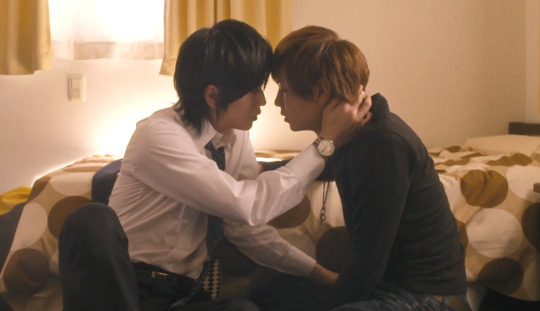
Seven Days
Seven Days: Monday-Thursday
Seven Days: Friday-Sunday
Japan 2015
Never doubt my ability to recommend this show. One of the best live action yaois ever made, with perfectly structured angst, fantastic characters and acting, and no problematic tropes (rare in Japanese BL). The leads have excellent chemistry although it’s low heat there’s still some really cute mutual kisses.
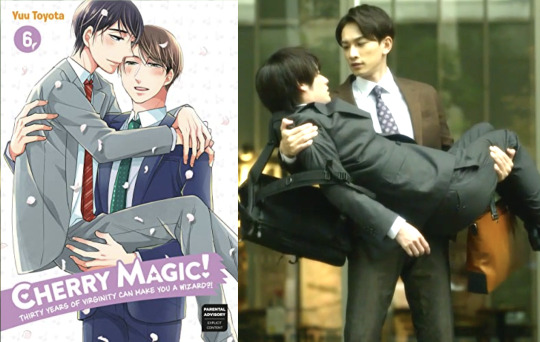
Cherry Magic AKA 30-sai made Dotei Da to Mahotsukai ni Nareru rashii
Japan 2020
The sweetest fluffiest magical realism BL, packaged as a pinning office romance, very low heat (practically chaste) but the cutest. It’s truly great.
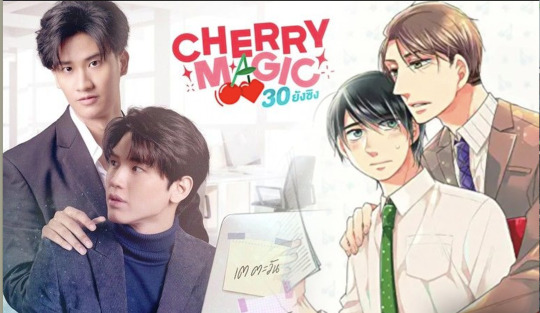
Cherry Magic Thailand
Thai 2024
A soft charming warm hug of a show about crushes and mind reading and self worth, with no-fuss execution from a consummate team and an OG lead pair proving why they remain eternal and deserve to grow up. Look, here’s the thing, Cherry Magic is a great Thai BL in its own right not comparing it to any other iteration. But even when I do compare (and I've seen all the Cherries and read the manga) it still stands. I personally like it slightly better than the Japanese live action, but I think that’s because I just really like Thai BL and I LOVE TayNew. Also all the kissing was both present and better than any other iteration. As it should be from Thailand.
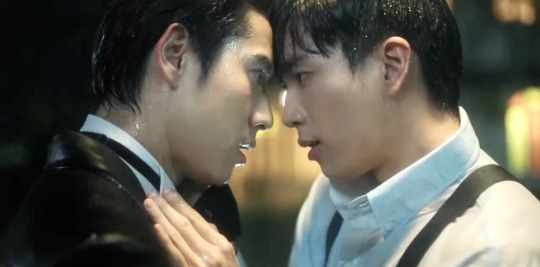
I Feel You Linger in the Air
Thai 2023
IFYLITA is an exquisite BL, from filming techniques to narrative framework (much like Until We Meet Again). Steeped in history and family drama it edges into lakorn (but no as much as To Sir With Love and with way less scenery chewing). This is an elegant and classy BL... from Thailand which normally doesn't even try for classy. The main couple (both as a pair and individuals) were excellent, particularly Bright (Yai) whose eye-work acting style is a personal favorite of mine. Pity about the ending. Oh it wasn’t that sad but it wasn’t good either. This show could easily have earned a 10/10 from me except that it fumbled the… erm… balls in the final quarter. Argh. Whatever.
All about the ecstasy and the agony here.
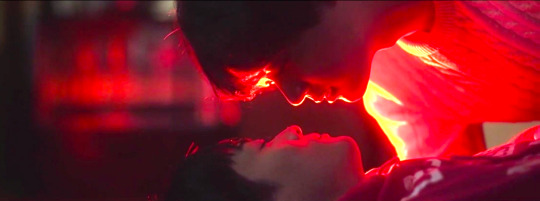
Restart After Come Back Home AKA Risutato wa tadaima no ato de
Japan 2020
Atmospheric study in rural Japan meets complex family dynamics built on a romance framework of city boy meets country boy, grumpy/sunshine. It’s beautiful and icy sweet. Slow moving in places but ultimately worth the patience, low heat, low angst, and stunning.
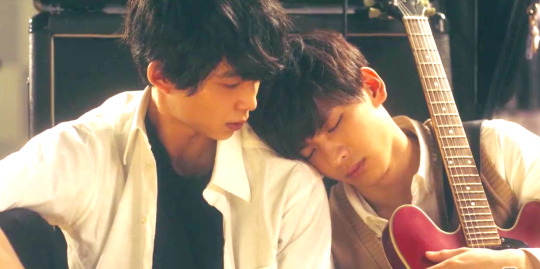
Given
Japan 2021
Boy joins band, falls in love with other boy. The singing is terrible, fast forward through that but with the possible exception of the hair styles, this BL could have been made in 2015 and no one would be surprised. As such, it wasn’t ground breaking, but it didn’t disappoint either.
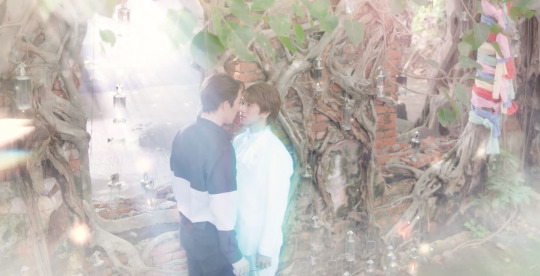
Make a Wish
Thai 2023
A doctor who can see the dead strikes a bargain with a wish-granting irreverent tree angel - naturally they fall in love (from Sammon: Manner of Death & Triage). Stars Fluke Natouch opposite not Ohm, but who cares because Fluke has chemistry with everybody. Once again the Thai afterlife is incredibly bureaucratic but I enjoyed the premise and the unfolding of the story (it’s not predictable but still satisfying and with nice little twist). I like that the doctor is just gay AF - fag hag bestie and all the swagger. The cast is excellent but the comedic stylings are a bit overblown and tonally off. It had sad parts and did make me cry but is ultimately happy with a great sex scene, good smiley kisses, and all the agency.
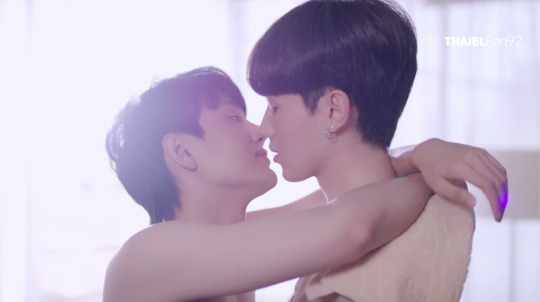
2 Moons The Ambassador AKA 2 Moons 3
Thai 2022
A Thai pulp that felt like it came out 5 yrs ago with many of the flaws inherent to that time and studio system, including manufactured angst and convoluted plot, but an ultimately sweet main couple that (as a pairing) feels a bit more modern and satisfying to watch than they started out. This will probably go down in history as one of the few BLs where I genuinely didn’t care about any of the side couples. All that said I find this show oddly appealing and rewatchable and I have no excuses for that.
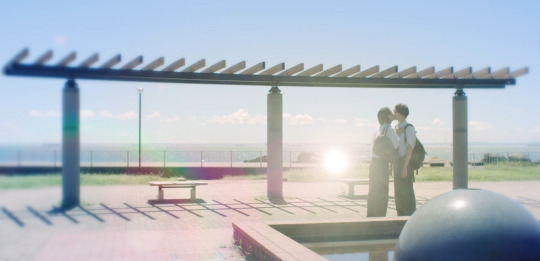
I Want to See Only You AKA Kimi no Koto Dake Mite Itai
Japan 2022
This is a beautiful, well acted piece of cinema, about two boys who are opposite personalities and grew up together. Gifted and serious Sakura pines after outgoing eccentric manic pixie dream boy, Yuma. It is very pretty and this is the kind of atmospheric elegantly performed BL that only really comes from Japan (complete with dead fish kisses - what you though Korea invented them? oh no).
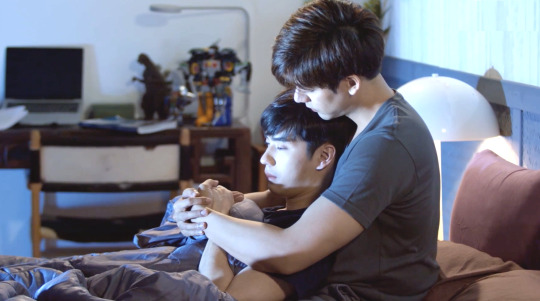
Triage
Thai 2022
BL does Groundhog Day featuring a doctor stuck in a time loop who must save a poor little rich boy from death by seducing the stuffing out of him, then PLOT TWIST, poor little rich boy must do the same for doctor! Unfortunately... stuffing keeps leaking. I thought the plot was engaging if a little redundant and occasionally exhausting. The pairs were all well done, low heat but with decent chemistry and the support characters were likeable (or unlikeable, as required). If anything, the romance arc detracted and distracted from the main plot, but that doesn't stop this from being a genuinely good show.
HONORABLE MENTION
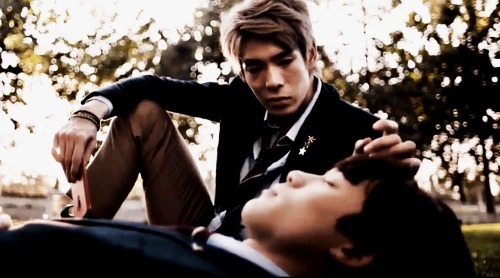
Great Men Academy
Thai 2019
Bodyswap involving unicorns making a teenage girl into a boy makes this questionable as a BL (because, ya know, gender). But the fact remains that James is killer in the lead, and I (who do not like bodyswap) loved this damn show. Look, there is actual plot, hotties at boarding school, "bully the one you love" trope, some weird VR shit, very bad CGI, and yes, the boys end up together... whether they boys or not, so to speak.
Some of these shows may appear on a smaller streaming service, like WeTV, or they may be on a legal platform in your territory. I hope it goes without saying you should check there first.
(source)
This list updated Spring 2024, not responsible for cool stuff that went missing (or was added to a platform) after that date.
It's it last in a series the rest of which are:
#Seven Days#Seven Days: Monday-Thursday#Seven Days: Friday-Sunday#japanese bl#bl recommended list#best bl list#great bl you may no know about#adapted from a manga#live action yaoi#Cherry Magic#30-sai made Dotei Da to Mahotsukai ni Nareru rashii#Cherry Magic th#cherry magic thailand#I Feel You Linger in the Air#thia bl#Restart After Come Back Home#Risutato wa tadaima no ato de#given live action#given the series#make a wish#2 Moons The Ambassador#2 Moons 3#I Want to See Only You#Kimi no Koto Dake Mite Itai#triage#Great Men Academy
227 notes
·
View notes
Text
you know what i think really gets me as a good omens fan who also grew up catholic? the very human approach it takes to morality.
i can’t speak for every denomination of christianity, but i can speak to catholicism. i grew up in the church, i went to catholic school, i was confirmed for fuck’s sake. i know the catholic church. the ways in which it eats away at your self esteem. the ways in which it makes you feel like you are a terrible person because you’ve sinned in one way or another. the way you’re taught the concept of original sin as though it isn’t deeply unsettling to believe that all humans are born corrupt. you’re taught that you were born tainted by satan, you as a baby you as a child you who doesn’t even know your place in this world yet. you are sinful because you are human.
there is no room for shades of grey in catholicism. you have either sinned or you haven’t. you are either good or you are bad. you are either going to heaven or you are cursed to damnation. (yeah yeah purgatory and all that but if i’m being honest the diocese i was a part of never really talked about it)
we all know the church is corrupt. every catholic knows that, but whether or not we ever admitted it to ourselves and accepted it as truth is another story. you cannot deny the staggering statistics regarding catholic priests assaulting and molesting children. you cannot deny the financial corruption that has been present in the institution for centuries. but you can ignore it. you can ignore it and pretend like the church is perfect and good because if you allow yourself to admit it’s issues, you admit that maybe your entire world view is flawed. that maybe the idea of morality as being black and white is wrong.
that's what i grew up with. with these contradictory beliefs. these adults in power telling me i was inherently sinful because i was human while also being told that God loves me. that God will save me from myself. so i grew up thinking someone else could fix me. because if i was inherently bad i couldn't fix myself.
but of course, the truth is, i don't need fixing. i'm not broken or bad. i'm human.
when aziraphale described adam as "human incarnate" i got EXTREMELY emotional. because to be human incarnate is to be not good or bad. it's to just be. be whoever it is you are. make the best choices you can. will they all be perfect? of course not. but will you be trying your damndest? yes.
good omens is a breath of fresh air for me and my religious trauma because the thesis of the story is that black and white thinking is unproductive at best and actively harmful at worst. you cannot live a fulfilling life while also believing there is only Bad and Good, and that Bad and Good are inherent.
good omens is a comfort because it reminds me in more ways than one that i'm worthy of love. i'm worthy of life. i don't have to be perfect, far from it. i'm allowed to be messy and make mistakes, but none of that means i don't deserve to be here. none of that means i'm a Bad Person. i'm just, A Person.
i'm trying. i've always tried. tried to love the best i can, tried to be the best person i can be, tried to live my life to the fullest, tried to cultivate joy for myself.
my brain is a mess. and 15 years, give or take, of being fully immersed in the catholic church (including 7 years of catholic school) definitely didn't help. i am still riddled with catholic guilt and toxic mental frameworks because of the time i spent in the church.
but good omens helps me work through it just that little bit more. it's there in its corner of my heart saying "hey. you're human. you're not Bad or Good, you're You. and you're trying."
it's... comforting. yeah, i think that's the right word.
#found this one in my drafts and finally decided to finish it#good omens#good omens meta#gomens meta#cw religious trauma#religious trauma#catholic trauma#catholicism
273 notes
·
View notes
Text
I think I'll just say this: I don't agree when people call any of the islanders "bad parents" just because their parenting is flawed.
Like, parents and their parenting is flawed. Inherently. One parent cannot meet all the demands of their child; it is literally impossible. As humans are imperfect, there will always be something missing or lacking in one's parenting. Hell, sometimes even two parents can't meet all their child's needs, depending on their personalities. If that's the case, then I guess all parents are bad parents. But that's not the case, so I don't get why people are so adamant when they see that a parent isn't handling things 100% perfectly and go "wow this person's parenting sucks."
And this is even more so when you take into account... pretty much everything going on in Quesadilla island. These people never really planned to be parents, yet here they are! And this island is out to kill these kids, so it's also a dangerous game of survival now, too! There are horrors around pretty much every corner. Plus, outside or inside forces are making the islanders suffer very often. The islanders are never okay. How they take care of their children is going to be different just by the very basis of their environment. The standards of parenting are different here. Their relationships with people, including their children, were never going to be 100% healthy or positive or okay. It's just not possible.
so, no, I don't think that just cause, say, q!Tubbo or q!Phil aren't great in regards to their emotional intelligence and often isolate themselves, or when any other parents in general don't handle what their children are going through perfectly, that they're bad parents. That kinda statement feels like it diminishes pretty much all the hard work and effort and love they put into taking care of their kids and even kids that aren't their own. Tubbo gives his everything for Sunny, and was/is an active babysitter for a lot of other eggs. Phil works so hard to love and teach survival to and take care of his two eggs equally. (Like, being 'basically' a single parent, of one or WORSE, two, is already hard enough in the real world - imagine being one on this fucking hellscape they're on).
Like, I don't think there's anything wrong with pointing out the parents' flaws. Their flaws make them human, and it'd be foolish to disregard their humanity. And it's interesting to analyze their flaws and what they say about the character, and how they impact their family. There's nuance there, and it should be discussed.
But I think when you're just going "oh, they're bad at parenting in general" because they fumble the bag in other departments lacks nuance. Sure, if you're just saying "they're bad when it comes to certain aspects of parenting," that's a different story, because that's understanding their flaws while recognizing that those flaws don't define all of their parenting. But to just say they're bad at it in general isn't productive analysis of their characters in any way. I haven't watched q!Phil take care of his egg for a whole year (followed by a second egg more consistently shortly after) only for people to shit on his parenting just because his lack emotional intelligence is more noticeable as of recent due to all the trauma and bullshit he's endured. And I haven't seen q!Tubbo put his whole heart into taking care of Sunny as well as multiple other eggs, being Chayanne and Tallulah's reliable godfather, just for people to put down his efforts because he's not always great at more emotionally in depth conversations. They're good parents in a lot of ways, and those strengths shouldn't be discredited just because they aren't good at other things. Their characters deserve way better than that.
tldr these parents are all good in many regards and are just trying their damn best in the worst of circumstances, can we cut them just a bit of slack, please?
#qsmp#fuck it i'm tagging the characters i mentioned#philza#tubbo#missy rambles#also tldr this discourse is fucking dumb#like jesus calling them bad parents feels like it's shitting on all the time they've spent on this damn island taking care of these kids#all cause they're bad at talking about feelings sometimes? give me a break
188 notes
·
View notes
Text
After the avalanche of bad takes inspired by got and hotd I would just like to say that the point of asoiaf is not "feudal power corrupts" and it is not "no one can save Westeros because feudalism bad". I would like to remind you what the function of feudalism in the story actually is, as stated by GRRM:
The medieval setting has been the traditional background for epic Fantasy, even before Tolkien, and there are good reasons for that tradition. The sword has a romance to it that pistols and cannon lack, a powerful symbolic value that touches us on some primal level. Also, the contrasts so apparent in the Middle Ages are very striking -- the ideal of chivalry existed cheek by jowl with the awful brutality of war, great castles loomed over miserable hovels, serfs and princes rode the same roads, and the colorful pageantry of tournaments rose out of a brown and grey world of dung, dirt, and plague. The dramatic possibilities are so rich. ( Source)
Now his notorious statement about Aragorn's tax policy (as much as I vehemently dislike that statement concerning Tolkien, it is still very insightful for GRRM's work) :
Ruling is hard. This was maybe my answer to Tolkien, whom, as much as I admire him, I do quibble with. Lord of the Rings had a very medieval philosophy: that if the king was a good man, the land would prosper. We look at real history and it’s not that simple. Tolkien can say that Aragorn became king and reigned for a hundred years, and he was wise and good. But Tolkien doesn’t ask the question: What was Aragorn’s tax policy? Did he maintain a standing army? What did he do in times of flood and famine? And what about all these orcs? By the end of the war, Sauron is gone but all of the orcs aren’t gone – they’re in the mountains. Did Aragorn pursue a policy of systematic genocide and kill them? Even the little baby orcs, in their little orc cradles? (Source)
Moral relativism right? Nihilism, pessimism, every symbol is doomed to fail, every effort for a better future is doomed to fail because the feudalist structure is inherently rotten. Should we even try then? What is the point in showing a ruler genuinely try? If every leader is doomed to fall victim to external opposing forces and/or corruption or other moral flaw, what is the point in trying? Let's see another statement by GRRM where he explains what asoiaf is actually about:
"In a very basic level winter is coming for all of us. I think that’s one of the things that art is concerned with: the awareness of our own mortality. “Valar morghulis” – “All men must die”. That shadow lies over our world and will until medical science gives us all immortality… but I don’t think it makes it necessarily a pessimistic world (...) the important thing is that love, compassion and empathy with other human beings is still possible. Laughter is still possible! Even laughter in the face of death… The struggle to make the world a better place… We have things like war, murder and rape… horrible things that still exist, but we don’t have to accept them, we can fight the good fight. The fight to eliminate those things.There is darkness in the world, but I don’t think we necessarily need to give way to despair". (Source)
The combination of these statements speaks for itself to someone who has read GRRM's work: the sword has a romance that pistols lack, the dramatic possibilities of the medieval setting are rich, ruling is hard, we can fight the good fight, we should not give way to despair. From that to "No one can save Westeros" the distance is huge and the endpoint is extremely deceptive and also deeply reactionary. If no one can save Westeros, then there is no point in trying to save Westeros. Characters that try to save Westeros, or Essos, or the Wildlings, or anything bigger than their own ass, are not morally superior to others that just benefit from the current status quo or passively tolerate/enable it, since no one can actually do shit and every effort is doomed to fail. Yet this goes directly against the point of asoiaf that can be summed up in the phrase: "ruling is hard". It is hard alright, but the thing is, someone has to do it. Whether that someone has been chosen by the people, or by the gods, or by destiny, or by circumstances, and regardless of the political system that allowed them to yield that power, the point is that someone has power ad hoc at any given time, and power equals responsibility. What do you do with it? How do you govern? How do you choose between two equally grievous alternatives? Who do you listen to? Who do you trust? How can you learn? What if everything you've been told was a lie? How do you move on from there? What if the promises you made contradict each other? What if you fail? How do you live with the guilt, how do you go on? How do you instigate a structural change? What if you try to do that and people die? What if you try to do that and it kills you? Was it worth it? How do you use the power you have? How do you fight the good fight? What makes a fight good?
"Feudalism bad" and "no one can save Westeros" are not just incredibly uninspired catchphrases, they are something much worse: a very nice way of avoiding to answer the real, hard, uncomfortable questions that are the driving force of asoiaf, and a very neat way to justify those who tolerate, enable or reinforce the status quo. Coincidentally, these questions remain the same in every single political system. They are universal. That's why this is a good, relevant, applicable story, that's why we give a fuck even if the context is foreign to us. So spare us the moralizing bullshit please, and thank you for coming to my Ted Talk.
#All of these questions are actually stated (and occasionally answered) almost verbatim in the text of certain POVs btw#and y'all would know about it if you gave a fuck about those POVs#but you don't#because your investment in asoiaf starts and ends in certain characters that have nothing to do with all of the above#but don't make it our problem!#asoiaf#valyrianscrolls#aspa rambles#daenerys targaryen#jon snow
119 notes
·
View notes
Text
i'm thinking about nynaeve's line to egwene in the testing vision about how egwene will be a better "servant of all" than nynaeve ever could be. i love that moment so much! because it plays into one of my very favorite Themes from the books: the difference between heroes who focus on the greater good, sometimes at the expense of individuals (egwene, rand, moiraine, elayne) and heroes who focus on individuals, sometimes at the expense of the greater good (nynaeve, perrin, mat). and neither is inherently better or worse than the other, it's just two different ways of looking at the world! for each character, we see moments where their outlook is a strength as well as moments where it's a weakness/flaw.
i saw someone say that nynaeve undersells herself in that line because throughout the show we've seen HER be a servant of all. and that's very true............IF we define "all" as "the two rivers." nynaeve would die & kill for Her People, and for any other individuals she comes across who need her help, but she doesn't care so much about broader causes or ideals. her arc is really unique because it's an inverse leadership arc, i.e. she starts off in a leadership position but then as the story progresses, she realizes that she is not suited to leadership on the huge scale that's needed for the last battle and steps aside to let people like egwene and rand, who ARE suited to it, take up that leadership.
(if you will allow me a bit of #gawynposting, gawyn actually has a very similar arc in this respect: he starts off expecting to become first prince of the sword, but then when he gets his first real taste of large-scale leadership as the leader of the younglings, he's miserable. he doesn't care about the younglings' cause, he just wants to protect his specific loved ones, elayne & egwene, because at heart he is an Individuals Guy, not a Big Picture Guy. and so in the end he rejects his role as first prince and dedicates himself to protecting one specific person, egwene, as her warder. but the tragedy of his character is that even after all this he still can't shake the My Duty Is To The Big Picture conditioning that's been drilled into him since childhood, and thus focusing exclusively on protecting one single person during the last battle makes him feel selfish & guilty about "wasting" his fighting abilities and he decides it's his duty to sacrifice himself for the greater good. sob!)
anyway, i love this line because it's not true and also it's true. nynaeve IS a selfless servant of all, but egwene will be a better servant of all-all than nynaeve could be. because egwene is more able to set aside her personal feelings to focus objectively on what's best for the greatest number of people, whereas nynaeve just can't stomach the ruthless calculus of war (which, again, is not a knock on either character, they're simply different kinds of people and BOTH kinds are needed to win the last battle). and that's why it could only ever be egwene who got the amyrlin arc, even though you might initially expect it to go to nynaeve due to the setup of her being the most powerful aes sedai of the age.
#wot#wot on prime#the wheel of time#wot book spoilers#nynaeve al'meara#egwene al'vere#gawyn trakand#this particular Difference In Outlook is also part of what makes gawene so interesting & enjoyable to me esp their TGS/TOM conflicts#because this really is what's causing those conflicts at the root of it#egwene is focused on her big-picture duties and struggles to make room in them for a personal relationship#gawyn is focused on his personal relationship with egwene and struggles to make room in it for the big picture#but in the end they're able to help each other meet in the middle <3#gawyn learns to understand the difference between egwene as his girlfriend & egwene as his amyrlin#and to modify his behavior with her to be appropriate for the respective situation#and egwene learns to allow herself work-life balance and to metaphorically take the stole off when in private with her partner#and to share her burdens with him and ask him for help with them
173 notes
·
View notes
Note
Hey! It has been on my mind lately and i just wanna ask..idk if it would make sense but i just noticed that nowadays ppl cant separate the authors and their books (ex. when author wrote a story about cheating and ppl starts bashing the author for romanticizing cheating and even to a point of cancelling the author for not setting a good/healthy example of a relationship) any thoughts about it?
I have many, many thoughts on this, so this may get a little unwieldy but I'll try to corall it together as best I can.
But honestly, I think sometimes being unable to separate the author from the work (which is interesting to me to see because some people are definitely not "separating" anything even though they think they are; they just erase the author entirely as an active agent, isolate the work, and call it "objectivity") has a lot to do with some people being unable to separate the things they read from themselves.
I'm absolutely not saying it's right, but it's an impulse I do understand. If you read a book and love it, if it transforms your life, or defines a particular period of your life, and then you find out that the author has said or done something awful--where does that leave you? Someone awful made something beautiful, something you loved: and now that this point of communion exists between you and someone whose views you'd never agree with, what does that mean for who you are? That this came from the mind of a person capable of something awful and spoke to your mind--does that mean you're like them? Could be like them?
Those are very uncomfortable questions and I think if you have a tendency to look at art or literature this way, you will inevitable fall into the mindset where only "Good" stories can be accepted because there's no distinction between where the story ends and you begin. As I said, I can see where it comes from but I also find it profoundly troubling because i think one of the worst things you can do to literature is approach it with the expectation of moral validation--this idea that everything you consume, everything you like and engage with is some fundamental insight into your very character as opposed to just a means of looking at or questioning something for its own sake is not just narrow-minded but dangerous.
Art isn't obliged to be anything--not moral, not even beautiful. And while I expend very little (and I mean very little) energy engaging with or even looking at internet / twitter discourse for obvious reasons, I do find it interesting that people (online anyway) will make the entire axis of their critique on something hinge on the fact that its bad representation or justifying / romanticizing something less than ideal, proceeding to treat art as some sort of conduit for moral guidance when it absolutely isn't. And they will also hold that this critique comes from a necessarily good and just place (positive representation, and I don't know, maybe in their minds it does) while at the same time setting themselves apart from radical conservatives who do the exact same thing, only they're doing it from the other side.
To make it abundantly clear, I'm absolutely not saying you should tolerate bigots decrying that books about the Holocaust, race, homophobia, or lgbt experiences should be banned--what I am saying, is that people who protest that a book like Maus or Persepolis is going to "corrupt children", and people who think a book exploring the emotional landscape of a deeply flawed character, who just happens to be from a traditionally marginalised group or is written by someone who is, is bad representation and therefore damaging to that community as a whole are arguments that stem from the exact same place: it's a fundamental inability, or outright refusal, to accept the interiority and alterity of other people, and the inherent validity of the experiences that follow. It's the same maniacal, consumptive, belief that there can be one view and one view only: the correct view, which is your view--your thoughts, your feelings.
There is also dangerous element of control in this. Someone with racist views does not want their child to hear anti-racist views because as far as they are concerned, this child is not a being with agency, but a direct extension of them and their legacy. That this child may disagree is a profound rupture and a threat to the cohesion of this person's entire worldview. Nothing exists in and of and for itself here: rather the multiplicity of the world and people's experiences within it are reduced to shadowy agents that are either for us or against us. It's not about protecting children's "innocence" ("think of the children", in these contexts, often just means "think of the status quo"), as much as it is about protecting yourself and the threat to your perceived place in the world.
And in all honestt I think the same holds true for the other side--if you cannot trust yourself to engage with works of art that come from a different standpoint to yours, or whose subject matter you dislike, without believing the mere fact of these works' existence will threaten something within you or society in general (which is hysterical because believe me, society is NOT that flimsy), then that is not an issue with the work itself--it's a personal issue and you need to ask yourself if it would actually be so unthinkable if your belief about something isn't as solid as you think it is, and, crucially, why you have such little faith in your own critical capacity that the only response these works ilicit from you is that no one should be able to engage with them. That's not awareness to me--it's veering very close to sticking your head in the sand, while insisting you actually aren't.
Arbitrarily adding a moral element to something that does not exist as an agent of moral rectitude but rather as an exploration of deeply human impulses, and doing so simply to justify your stance or your discomfort is not only a profoundly inadequate, but also a deeply insidious, way of papering over your insecurities and your own ignorance (i mean this in the literal sense of the word), of creating a false and dishonest certainty where certainty does not exist and then presenting this as a fact that cannot and should not be challenged and those who do are somehow perverse or should have their characters called into question for it. It's reductive and infantilising in so many ways and it also actively absolves you of any responsibility as a reader--it absolves you of taking responsibility for your own interpretation of the work in question, it absolves you of responsibility for your own feelings (and, potentially, your own biases or preconceptions), it absolves you of actual, proper, thought and engagement by laying the blame entirely on a rogue piece of literature (as if prose is something sentient) instead of acknowledging that any instance of reading is a two-way street: instead of asking why do I feel this way? what has this text rubbed up against? the assumption is that the book has imposed these feelings on you, rather than potentially illuminated what was already there.
Which brings me to something else which is that it is also, and I think this is equally dangerous, lending books and stories a mythical, almost supernatural, power that they absolutely do not have. Is story-telling one of the most human, most enduring, most important and life-altering traditions we have? Yes. But a story is also just a story. And to convince yourself that books have a dangerous transformative power above and beyond what they are actually capable of is, again, to completely erase people's agency as readers, writers' agency as writers and makers (the same as any other craft), and subsequently your own. And erasing agency is the very point of censors banning books en masse. It's not an act of stupidity or blind ignorance, but a conscious awareness of the fact that people will disagree with you, and for whatever reason you've decided that you are not going to let them.
Writers and poets are not separate entities to the rest of us: they aren't shamans or prophets, gifted and chosen beings who have some inner, profound, knowledge the rest of us aren't privy to (and should therefore know better or be better in some regard) because moral absolutism just does not exist. Every writer, no matter how affecting their work may be, is still Just Some Guy Who Made a Thing. Writing can be an incredibly intimate act, but it can also just be writing, in the same way that plumbing is plumbing and weeding is just weeding and not necessarily some transcendant cosmic endeavour in and of itself. Authors are no different, when you get down to it, from bakers or electricians; Nobel laureates are just as capable of coming out with distasteful comments about women as your annoying cousin is and the fact that they wrote a genre-defying work does not change that, or vice-versa. We imbue books with so much power and as conduits of the very best and most human traits we can imagine and hope for, but they aren't representations of the best of humanity--they're simply expressions of humanity, which includes the things we don't like.
There are some authors I love who have said and done things I completely disagree with or whose views I find abhorrent--but I'm not expecting that, just because they created something that changed my world, they are above and beyond the ordinarly, the petty, the spiteful, or cruel. That's not condoning what they have said and done in the least: but I trust myself to be able to read these works with awareness and attention, to pick out and examine and attempt to understand the things that I find questionable, to hold on to what has moved me, and to disregard what I just don't vibe with or disagree with. There are writers I've chosen not to engage with, for my own personal reasons: but I'm not going to enforce this onto someone else because I can see what others would love in them, even if what I love is not strong enough to make up for what I can't. Terrance Hayes put perfectly in my view, when he talks about this and being capable of "love without forgiveness". Writing is a profoundly human heritage and those who engage with it aren't separate from that heritage as human because they live in, and are made by, the exact same world as anyone else.
The measure of good writing for me has hardly anything to do with whatever "virtue" it's perceived to have and everything to do with sincerity. As far as I'm concerned, "positive representation" is not about 100% likeable characters who never do anything problematic or who are easily understood. Positive representation is about being afforded the full scope of human feelings, the good, the bad, and the ugly, and not having your humanity, your dignity, your right to exist in the world questioned because all of these can only be seen through the filter of race, or gender, religion, or ethicity and interpreted according to our (profoundly warped) perceptions of those categories and what they should or shouldn't represent. True recognition of someone's humanity does not lie in finding only what is held in common between you (and is therefore "acceptable", with whatever you put into that category), but in accepting everything that is radically different about them and not letting this colour the consideration you give.
Also, and it may sound harsh, but I think people forget that fictional characters are fictional. If I find a particularly fucked up relationship dynamic compelling (as I often do), or if I decide to write and explore that dynamic, that's not me saying two people who threaten to kill each other and constantly hurt each other is my ideal of romance and that this is exactly how I want to be treated: it's me trying to find out what is really happening below the surface when two people behave like this. It's me exploring something that would be traumatizing and deeply damaging in real life, in a safe and fictional setting so I can gain some kind of understanding about our darker and more destructive impulses without being literally destroyed by them, as would happen if all of this were real. But it isn't real. And this isn't a radical or complex thing to comprehend, but it becomes incomprehensible if your sole understanding of literature is that it exists to validate you or entertain you or cater to you, and if all of your interpretations of other people's intentions are laced with a persistent sense of bad faith. Just because you have not forged any identity outside of this fictional narrative doesn't mean it's the same for others.
Ursula K. le Guin made an extremely salient point about children and stories in that children know the stories you tell them--dragons, witches, ghouls, whatever--are not real, but they are true. And that sums it all up. There's a reason children learning to lie is an incredibly important developmental milestone, because it shows that they have achieved an incredibly complex, but vitally important, ability to hold two contradictory statements in their minds and still know which is true and which isn't. If you cannot delve into a work, on the terms it sets, as a fictional piece of literature, recognize its good points and note its bad points, assess what can have a real world impact or reflects a real world impact and what is just creative license, how do you possible expect to recognize when authority and propaganda lies to you? Because one thing propaganda has always utilised is a simplistic, black and white depiction of The Good (Us) and The Bad (Them). This moralistic stance regarding fiction does not make you more progressive or considerate; it simply makes it easier to manipulate your ideas and your feelings about those ideas because your assessments are entirely emotional and surface level and are fuelled by a refusal to engage with something beyond the knee-jerk reaction it causes you to have.
Books are profoundly, and I do mean profoundly, important to me-- and so much of who I am and the way I see things is probably down to the fact that stories have preoccupied me wherever I go. But I also don't see them as vital building blocks for some core facet or a pronouncement of Who I Am. They're not badges of honour or a cover letter I put out into the world for other people to judge and assess me by, and approve of me (and by extension, the things I say or feel). They're vehicles through which I explore and experience whatever it is that I'm most caught by: not a prophylactic, not a mode of virtue signalling, and certainly not a means of signalling a moral stance.
I think at the end of the day so much of this tendency to view books as an extension of yourself (and therefore of an author) is down to the whole notion of "art as a mirror", and I always come back to Fran Lebowitz saying that it "isn't a mirror, it's a door". And while I do think it's important to have that mirror (especially if you're part of a community that never sees itself represented, or represented poorly and offensively) I think some people have moved into the mindset of thinking that, in order for art to be good, it needs to be a mirror, it needs to cater to them and their experiences precisely--either that or that it can only exist as a mirror full stop, a reflection of and for the reader and the writer (which is just incredibly reductive and dismissive of both)--and if art can only exist as a mirror then anything negative that is reflected back at you must be a condemnation, not a call for exploration or an attempt at understanding.
As I said, a mirror is important but to insist on it above all else isn't always a positive thing: there are books I related to deeply because they allowed me to feel so seen (some by authors who looked nothing like me), but I have no interest in surrounding myself with those books all the time either--I know what goes on in my head which is precisely why I don't always want to live there. Being validated by a character who's "just like me" is amazing but I also want--I also need-- to know that lives and minds and events exist outside of the echo-chamber of my own mind. The mirror is comforting, yes, but if you spend too long with it, it also becomes isolating: you need doors because they lead you to ideas and views and characters you could never come up with on your own. A world made up of various Mes reflected back to me is not a world I want to be immersed in because it's a world with very little texture or discovery or room for growth and change. Your sense of self and your sense of other people cannot grow here; it just becomes mangled.
Art has always been about dialogue, always about a me and a you, a speaker and a listener, even when it is happening in the most internal of spaces: to insist that art only ever tells you what you want to hear, that it should only reflect what you know and accept is to undermine the very core of what it seeks to do in the first place, which is establish connection. Art is a lifeline, I'm not saying it isn't. But it's also not an instruction manual for how to behave in the world--it's an exploration of what being in the world looks like at all, and this is different for everyone. And you are treading into some very, very dangerous waters the moment you insist it must be otherwise.
Whatever it means to be in the world, it is anything but straightforward. In this world people cheat, people kill, they manipulate, they lie, they torture and steal--why? Sometimes we know why, but more often we don't--but we take all these questions and write (or read) our way through them hoping that, if we don't find an answer, we can at least find our way to a place where not knowing isn't as unbearable anymore (and sometimes it's not even about that; it's just about telling a story and wanting to make people laugh). It's an endless heritage of seeking with countless variations on the same statements which say over and over again I don't know what to make of this story, even as I tell it to you. So why am I telling it? Do I want to change it? Can I change it? Yes. No. Maybe. I have no certainty in any of this except that I can say it. All I can do is say it.
Writing, and art in general, are one of the very, very, few ways we can try and make sense of the apparently arbitrary chaos and absurdity of our lives--it's one of the only ways left to us by which we can impose some sense of structure or meaning, even if those things exists in the midst of forces that will constantly overwhelm those structures, and us. I write a poem to try and make sense of something (grief, love, a question about octopuses) or to just set down that I've experienced something (grief, love, an answer about octpuses). You write a poem to make sense of, resolve, register, or celebrate something else. They don't have to align. They don't have to agree. We don't even need to like each other much. But in both of these instances something is being said, some fragment of the world as its been perceived or experienced is being shared. They're separate truths that can exist at the same time. Acknowledging this is the only means we have of momentarily bridging the gaps that will always exist between ourselves and others, and it requires a profound amount of grace, consideration and forbearance. Otherwise, why are we bothering at all?
#this is so much longer than i intended but yeah. those are my very long 2 cents#tbh i also think social media makes it worse in a way especially bc “transparency” has become a form of public vetting which is insane to m#me* transparency and honesty are not the same thing ans its ludicrous that this is where we're at and while we all have to live with this#demand for transparency i do think it affects writers differently bc the whole art as mirror thing comes to the fore in this argument#why would you sit with your feelings about a book when its easier and more accessible for you to @ the authors twitter handle#but anyway#ask#anonymous#book talks
398 notes
·
View notes
Text
Cherry Magic Anime Ep 12 (Finale) Stray Thoughts
Last week, the boys made a right mess of themselves. Adachi went to visit Nagasaki to scout out the new position, and send a letter to Kurosawa while he was there. Thankfully, Kurosawa is a simp, and the letter accomplished its job. Kurosawa went to Nagasaki to see Adachi, and finally got to hear Adachi express clearly how much Kurosawa means to him. We left the two of them in bed, and Adachi likely no longer has his powers. Meanwhile, Tsuge tried to support Minato from a distance, but Minato chased after him and the two properly connected.
Thank you, Cherry Magic Anime, for confirming that Adachi could hear Kurosawa’s thoughts during their first encounter.
I like that this version dwelled in the loss of Adachi’s power, and what it meant for Adachi. I especially like that he asserts that it has little to do with the definition of a virgin and the physical realities of sex, and instead has to do with Adachi’s willingness to be open and vulnerable with Kurosawa.
My man Kurosawa is crying because he knows he’s loved and it’s what he deserves.
Okay, Adachi saying that Kurosawa’s warmth and scent are stronger now that he’s not hearing his thoughts is such an excellent detail. Good job, Cherry Magic Anime.
Hell yeah, Adachi! You should take on this new project that excites you, and also accept the inherent promotion! So happy that he’s serious about trusting Kurosawa and speaking openly about how excited he is about this opportunity. I like that he recognizes that his relationship with Kurosawa has made him braver.
Very funny that Adachi forgot about the power and that’s how Tsuge found out. I also like seeing Tsuge be impressed with Adachi taking a major step forward before him.
I have missed Fujisaki. I’m glad we got a little bit of her.
Oh boy. Adachi is being worn out from all of the difficulties that come with his new responsibilities.
I love Adachi going back to Tokyo to talk with Kurosawa about his anxieties. Recognizing that something bad could happen to either of them and no one would know about them is actually so frightening, and a genuine gay reality.
Adachi saying they should live together and Kurosawa putting a ring on it feels like the right balance for them.
Look at that splash of domesticity for both couples at the end as a treat.
They got married!! Fujisaki won!
What a lovely stinger at the end.
Final Verdict: 9, Highly Recommended. I really like this version of the entire cast. They’re far more flawed in a way that makes them a little less likable, but it also makes me empathize with all of them a lot more. I like that Rokkaku was such a dick early on to Adachi, so it lands when he finally starts to respect him properly and remember his name. I love how mundane Cherry Magic as a story is, despite the magic power. I absolutely loved this version, and it and the Thai version will stay on my recommendations list for a really long time. The Thai version may be the best show of the Cherry Magic stories, but this one has my favorite versions of the characters.
#Ben watches#cherry magic#cherry magic anime#cherry magic! thirty years of virginity can make you a wizard?!#30 sai made doutei dato mahoutsukai ni nareru rashii#japanese bl#bl series
55 notes
·
View notes
Text
A Starstruck Odyssey, and Masculinity
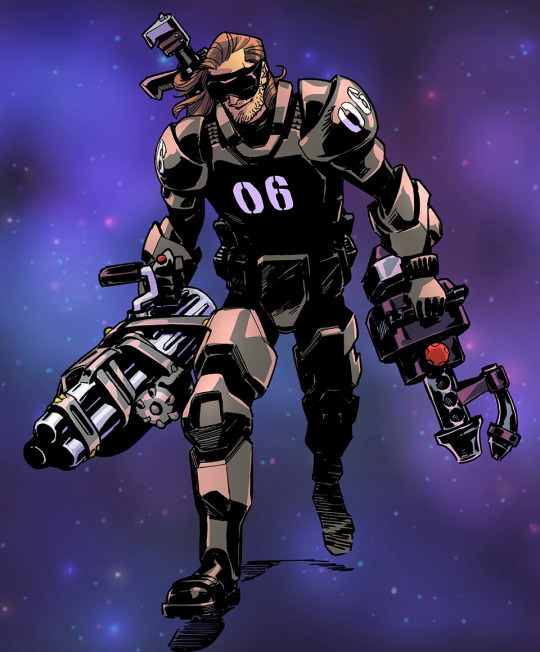
I have thoughts and am just gonna unload them on Tumblr. That's what we do here, right? I recently have been re-listening to Starstruck and have had some thoughts on it's depictions of masculinity. This isn't a serious post per se, just some thoughts and observations.
Starstruck has a wide spectrum of masculine characters on display, though a lot of it is hostile/toxic. Most men or male-coded characters are either outright villains, or more neutral parties with some toxic and selfish tendencies. Don't get me wrong it's a wild violent galaxy and that's the point, the entire party participates in scamming, kidnapping, exploitations, and unnecessary murder and we love to see it, it's not like it explicitly makes all men out to be inherently more monstrous and evil than others. But I do think the depictions of masculinity can be interesting to observe. Amercadia is a pretty cut and dry critism of the patriarchy and American nationalist culture, which is fantastic worldbuilding to include. Many of the masculine-coded androids are actually pretty nice, friendly and helpful or serious about their jobs, aside from a bitchy one in the beginning who injects our main 'droid with an anxiety spike about being one of a kind. Pretty much all of the Slugs we meet occupy masculine bodies, and they seem to have an abstract gender that picks up pronouns from the body they occupy, though the monarch is objectively a king and uses masculine pronouns even before getting a body, and he's pretty selfish and stupid.
But the main pair I'm thinking of, is Barry and Gunnie. Looking at the two of them, there's a lot you can assume. Big Barry Syx is this massive, bulky dude in power armor and shades with a mullet, while Gunnie is a 4' 11" techie cyborg with a big ol' smile. Listen to them in action and many of your assumptions are reinforced; Barry is a total dude-bro associated with nuts, steroids, working out, and acting much like gym bros in our modern life, while Gunnie is a hyperactive technician just doing his best, despite being mired in sympathetic tragedy. Barry's trauma is fairly fantastical or common to stories, having his family gunned down by one of his own, while Gunnie is mostly weighted down by medical debt after he got in an accident after trusting the wrong person. Based on these apperent details one would assume Barry is this toxicly masculine jackass who's insecure about his flaws, while Gunnie is the smartest man on board and is trying to keep everyone in line, doing the right thing, ect.
And of course, you'd be dead wrong. Gunnie, while a sympathetic and likable character, is *mired* in toxic masculine traits. While it was an accident that put him in his situation, it was brash foolishness and ignoring obvious red flags that got him in that position in the first place, not to mention a rebellion against his family driving him to it. Furthermore, as Lou himself admits in Adventuring party, Gunnie's *pride* is the reason his problems are so vast; He comes from a lot of money, his initial debt might have never happened or mostly gone away to begin with if he went back to his dads for help. His toxicity doesn't make him an unlikable character but he does have these traits. He's brash, prideful, and ignores common sense a lot. He is also very nice and friendly with others, listens to people, ect. He doesn't have *every* toxic trait in the book, but has them which I tend to not even notice because he's just a funny little guy.
Barry, meanwhile, is just about the most wholesome and giving person in the entire 'verse. Syx *And* Nyne, when not under a slug's control, are these total sweetheart bros. Sure, they shit talk each other with friendly ribbing, and yes they are very good at violence, but this violence is always motivated by helping those in need or fighting for those who can't fight for themselves, the Barry Battalion way. Barrys hate it when people are rude, or hurt the innocent. Barrys fight for their friends, provide endless support and praise, and will throw their very bodies into danger to protect or help, as seen on Rec 97 and in the big finale of the battle of the brands. And while the thing the love most is other Barrys, that does not mean that what they respect is also being heavily macho dudes. Barry one (or was is spelled differently? Barry Won? who knows) was the professor who created the other Barrys, a nerdy and fragile professor type, that the Barrys loved and treated as a fellow Barry *literally* the moment they were created. Even Syd is a Barry now, and that's accepted both by Barry Syx who's known her a long time and bonded with her, as well as Barry Nyne who literally, to his perception, *Just* met her, despite her appearance as like a waitress with an arm canon. Being a Barry, in other words, isn't about being just like them, having the name Barry, or anything like that. It's a vibe, it's a way to be, and the 'verse is better off with these super wholesome boys who, despite embodying many stereotypes of the gym bro, posses *none* of the commonly toxic traits also associated with that. They aren't insecure around smarter people or those with different skillsets, they hold no gendered assumptions, and they never wanna use their might to opress others for their own satisfaction.
Just, some thoughts.
65 notes
·
View notes
Text
To celebrate my Lion au post, here are some notes / hcs:
Lionblaze, Jayfeather, and Hollyleaf all have arcs that tackle different themes throughout the arc.
Jayfeathers arc tackles the prophecy-oriented side of things. His character changes the least. I do plan to tweak the way time travel works though (it will be more directly connected to their present - day tribe). Will keep up to date in that regard....
Hollyleafs character is, obviously, altered to an extent. She tackles the code-oriented side of things. She does not murder Ashfur, however..:
Hollyleaf is still driven mad by the truth of her heritage. She is angry at Leafpool first and foremost, viewing her as the root of their problem, as Leafpool was the one to break the code by having kits in the first place. She still confesses the truth at the gathering. She does not run into the tunnels, instead, somewhere more far off.....
After Ashfur is murdered, Lionblaze, wracked with guilt, confesses the crime to his siblings. Hollyleaf, blinded by her code-obsessed rage, later exposes the truth of what happened. Brambleclaw covers for him, similar to how Bramble covered Holly in the books.
Lionblazes character is altered the most (no surprise there). Lionblaze tackles the family-oriented side of things. He is very close to his parents, and you can see most of their drama / conflict through his perspective.
Lionblaze is a character who is simultaneously well-meaning, impulsive, and a bit self-focused. Similar to his grandfather he cares greatly for doing the right thing, even if it means breaking the code (much to Holly's disdain). However, what differs the two is Lionblazes hyper-awareness over his own reputation. Firestar is a cat who will do the right thing, no matter the slack he gets for it, no matter the enemies he makes. But Lionblaze is a cat who needs to be liked.
Due to the nature of his power, Lionblaze becomes increasingly insecure and hyper-aware of the cats around him (he views it as an inherent flaw ; a reason for cats NOT to like him). After his run-in with the Dark forest, he grows paranoid of accidentally harming / killing innocent cats. Frequent nightmares. Battle training sometimes induces panic. Bad habit of bringing home half-shredded prey. He wants to be a good cat, he wants to protect his clan and his family -- but his power only leaves him feeling like a monster. A ticking time bomb. All he's good for is doing the most damage possible, and that's scary to him.
Lions dynamic with Ashfur is expanded upon A LOT MORE. Now, in my au their dynamic is a bit of a mixed bag. They have their bad moments, days where Ashfurs resentment seeps through, but its not all bad. If you know the kind, you know -- The type of adult who will yell at you for a simple mistake, beat you down, but then 10 minutes later praise you and take you out for dinner as a treat. Its complex, it's hard to accept it for the toxicity it truly is, because "They're good sometimes, too". Lionblaze acknowledges that Ashfur was mean, but the attachment is still there. They had their good, genuine moments -- so it's hard to accept the fact that his mentor is a horrible person. Could it be? Could the mentor who told him funny stories about his parents, truly hate them that much? He can remember a time Ashfur peered down at him, smiled and said, "You know, Lionpaw, you're kind of like a son to me." In the moment he felt warm, it felt good. Did Ashfur really care for him that much? Now that same memory sends chills rippling through his fur.
Speaking of, Lionblaze is definitely the most attached of the three. He's incredibly close with Squirrelflight and Brambleclaw. When the truth is revealed, he is easily left the most (emotionally) devastated -- but he is also the first to forgive. He feels hurt, angry, betrayed, but he cannot deny the love he feels for his family, and he cannot deny the love they gave to him. It breaks his heart keeping his distance, seeing the hurt in his mothers eyes while he avoids their presence. He can't keep it up for long. Jayfeather, on the other hand, cant bring himself to forgive as quickly. He is a cat who has difficulty accepting vulnerability - he trusted his family, and that trust was betrayed. (Lion definitely has a bad habit of getting involved in his parents arguments later on lol hes emotionally invested)
The big change: Lionblaze kills Ashfur. You would think he does it out of anger, out of hatred, but no... He does it to keep his family safe. He can't let the secret get out. He can't allow Ashfur the opportunity to harm his littermates, his mother, again. Killing him was the only way, and yet, it leaves him with too much grief and guilt to bare. His entire life he shuddered at the idea of another cat dying at his claws. He was a monster, too strong for his own good, and killing would be nothing more than proof of that. It isn't long before it becomes too much to bare, and he confesses to his littermates. The grief, most of all, is what catches him by surprise. Ashfur was awful, he tried to kill Lionblaze and his littermates! It was wrong to feel this grief, wasn't it? But it isnt long before Lion realizes he wasnt grieving over Ashfur - he was grieving over who he thought Ashfur was; not only his mentor, but a tom who cared for him, despite the short attitude. Not only is his heritage, his upbringing a lie - but so is the very nature of his entire apprenticeship. It is a lot for him to handle.
#wc#warrior cats#warriors#thunderclan#lionblaze#hollyleaf#jayfeather#ashfur#squirrelflight#leafpool#brambleclaw#wc au#warrior cats au#warriors au#wc headcanon#warrior cats headcanons
81 notes
·
View notes
Text
Investigators’ Truth in Eureka: Investigative Urban Fantasy
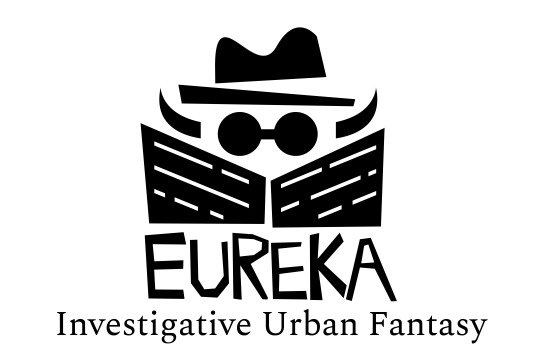
We have mentioned before on this blog when talking about Eureka: Investigative Urban Fantasy that in Eureka roleplay is mechanics-driven and mechanics are roleplay-driven, but what does that mean?
The short version is that when making your PC, you put things on their character sheet that give bonuses when they act in a way that is consistent with their intended characterization.
One of these elements is called a character’s Truth. Every Eureka PC has a Truth, and they may even have multiple Truths. A Truth can even change as a result of events in the campaign.
A character’s Truth is some strong element of their personality or beliefs that is likely to spur them into action, get them into trouble, or both. It is not necessarily a flaw, but it easily can be, as one of the main purposes of it is to encourage and reward players for letting their characters screw up.
When playing a video game or a TTRPG, it’s often very easy to sit back and think out every problem and approach them perfectly logically, especially when time usually pauses as you discuss the next move among the other players at the table. But if every character in a movie or book or any other story always made the most perfectly logical decision, that would probably be a pretty boring story, and it certainly wouldn’t be a very realistic story. People don't always make the most logical decisions in real life.
However, when playing a game, it can feel like “losing” to intentionally make a character make a decision that you, in your logical detached mind, know will probably not work out well for them in the long run. Eureka argues that this is not “losing”, and that this is actually exactly how Eureka is supposed to go. To encourage this, we added the Truth mechanic.
Like I said before, Truth is not exactly a flaw, just some part of the character’s personality or beliefs that would spur them to action or get them into trouble. It could be a hot temper, a need to always have the last word, an overly competitive nature, a love of violence, or a compulsion to lie, but it could also be a strong desire to selflessly protect others, or the trust that one’s fellow man are inherently good.
Whatever it is, when a character acts within the parameters of their Truth, they get a +1 to the dice roll for whatever it is they’re doing, or whatever dice roll results from them acting in their Truth.
This doesn’t mean that a character acting within their Truth is always the worst course of action on their part, sometimes emotional gut decisions do turn out to be right. Maybe a character whose Truth is somehow based around trusting others is right to lower their weapon, because the monster might be just as scared of them as they are of him, and that +1 Truth Bonus is going to come in handy in the resulting Comfort roll to try and de-escalate the situation—or maybe they’re completely wrong and the monster was just waiting for an opportunity to seize the upper hand, and that +1 Truth Bonus is instead going to be used on an Athletics roll to run like hell.
This also doesn’t mean that a character always has to act within their Truth, no one realistically reacts the exact same way to every situation, and we do not encourage GMs to push or punish players if their characters do not act within their Truth, but Truth helps reward realistic, in-character behavior from the PCs.
In this way, the rules/mechanics of Eureka: Investigative Urban Fantasy are tied directly to the roleplay of the character, and the roleplay of the character is encouraged and supported by the rules/mechanics.
Stay tuned for another post about a way that in-character roleplay and rules/mechanics are intertwined with the Traits system.

You can also pick up a pre-release PDF copy of this game(in a fully playable state) for $5 through our Patreon.
#eureka: investigative urban fantasy#coc#eureka#tabletop#call of cthulhu#monster of the week#motw ttrpg#motw rpg#roleplaying#indie rpg#dnd#rpg#ttrpg
130 notes
·
View notes
Note
I absolutely love your lore theories for LoP! Very new to the fandom :). Stayed up all night reading your posts abt it whahaha please keep making them!
Just wanted to ask what you think, if Camille was the recorded first puppet with an awakened ego and was Carlo's mom... does that mean Geppetto let his wife be experimented on by the alchemists upon her death or???
Another thought, do you think Sophia knew Geppetto's plans? Given that she reached out to P at the very beginning and called him by name ((geppettos puppet)) She knew Simon's plans yeah. But what abt Geppettos?
Thank you so much for your kind ask!!!
I panicked briefly because I thought I lost this ask somewhere. I have a LOT of thoughts surrounding Camille and parts of the game that I struggle to put together really cohesively, so on certain topics, i'm just going to ramble.
So, there is this image from the opening cutscene.
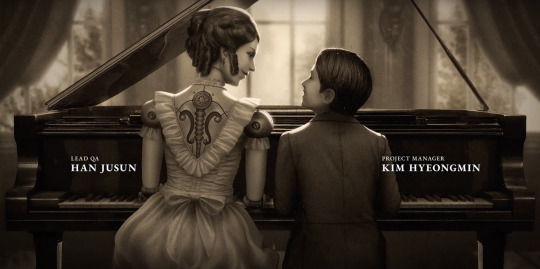
Maybe it isn't literally Camille and Carlo, but it may be alluding to them. [And what are they shown playing here? dundundun]
There is a particular affinity and focus the game has on the Piano as well.
Music is so linked to humanity in this game, i think it's very sweet.
There was also this really interesting post about the blue fairy (in the og collodi novel) that I don't think I can dig up anymore, but I remember it was something like this. It was pointing out that, realistically, the blue fairy really isn't a good parent. She lets a seven year old child be hanged on a tree, she watches by as he is enslaved; she makes him "work" for the right to be a real boy instead of reasonably granting him it, etc. The blue fairy also appears omniscient or goddess-like, appearing as a child, a young woman, a goat, and a mother (in perhaps her most adapted incarnation).
if Sophia's knowledge is endless, couldn't she have warned us about geppetto? wouldn't she know about carlo (someone she knew as a child) being tortured in a box? was it her discretion to let us suffer, because he needs to be able to suffer to be strong? Does that make her a moral or ethical person? Can any personhood with omniscience, who, in a sense, allows evil to happen, be moral or just? Perhaps, herein lies the philosophical, inherent flaw, in any relationship with an omniscient being, but I digress.
However, I think Sophia's endless knowledge that Arlecchino [sadly I write his name wrong every time] refers to is spiritual, or emotional, in a sense: that because she could manipulate time, all of it was at her disposal. When we wake up in the train car, her words are: "There you are, I've been looking all over for you!" She could not have known where we were, if she was searching for us (possibly through the blue butterfly figure we see). Also, I think she could've warned us about Geppetto.. but maybe then we wouldn't have gone to save her, and her goals are to get us to save her from Simon, which I believe she either says or suggests are "selfish" intentions (although I think she is very well within her right to have tbh). I don't think she is all-knowing in the way that Simon's world of truth would be. Maybe it's just a plot hole, perhaps it's just a "flaw" innate in writing any story with an omniscient character, but I don't think she was omniscient in that fashion.
And then coming back to Camille: One of my absolute favourite things about the game is the Saintess of Mercy Statue/Pieta Motif that we see in the Grand Exhibition. And Camille, who is inferred to have been the mother of Carlo, is said to have engineered the statue. She is directly connected to the game's central visual motif of death and rebirth. And then the statue also being diegetically[not a word apparently?] associated with rebirth and renewal ("Bring new life to puppets") in that you are "re-setting" and re-spec your character's stats there??? Equal parts beautiful and spectacular and touching.
[I feel SO sad that apparently, not every gamer got to see the statue. Opening those doors after the phone call riddle and then the camera panning up to the statue is such an amazing and special moment to me, and then the fact that it's also raining (another symbol of birth) too]
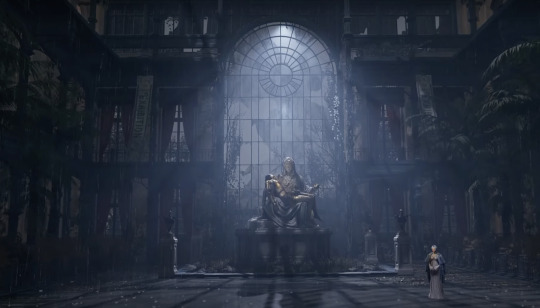
I don't know if the Camille puppet was literally the same Camille (who may have been the wife of Giuseppe), though. We know that she seems to have saved a baby from falling, on which afterwards she says "bring me back to my child". Not only is the Camille puppet a devoted mother character, she's also the first puppet to awaken (in other words, being associated with the idea of birth). "Camille" is so tied to the idea of motherhood and birth, that I think the Camille puppet is another connection here, and may not literally be the same Camille who was a technician. Although, I don't put it past Geppetto to be doing nefarious experiments with puppets, even if it were his wife. It might be a little ominous in regards to his attitude to P, that he doesn't see puppets as "people", but he does see people as puppets.
#lies of p#lop#liesofp#lies of p spoilers#spoiler#pinocchio#ask#chikirya#camille#speculation#blue fairy#sorry i take very long to respond to any engagement thank you again everyone.#spoilers#tw hanging
42 notes
·
View notes
Note
As a romance die-hard aww are you saying there’s been less romance with wukong in recent years? Is romantic wukong at least popular in chinese fandom?
I have to say that the early 2000s was definitely the height of Wukong Romance movies, and it has started to tether off. That doesn’t say that there aren’t any romance movies just not as much as probably what I would call the first wave of romance genre.
But yes most of the romance movies are actually very low quality, to say the least… most just feel like cash, grabs, or more comedy with a romance plot and a very flaky message. If anything, a lot of romance fans aren’t big fans of Xiyouji romance movies (besides Chinese Odyssey which kicked off the first wave of romance movies) because there isn’t a lot of attention or time given to the relationship, but rather, it’s mostly focused on Wukong moving on and growing from that heartbreak. If anything, I think the most successful romance movies that have Wukong as the romance partner are the kind that are inspired by the Chinese Odyssey like Bio of Wukong. Bio of Wukong also has the SO die but at least a lot of the movie was actually focused on them growing closer as characters. Many others are mostly forgettable or just boring. I would say that at least when it comes to Wukong being romanic in the fandom I wouldn't say the genre is 'popular' but more that people ship him with other people in the novel. There is a lot of crack shipping for fun as well but that is all in good humor as I think most people don't take shipping too seriously.
If anything, if you’re a huge romance fan I cannot recommend you more to start watching Bajie movies. Nearly every movie or TV show with Bajie as the main character, which is quite a bit, has romance in it and honestly, I think it’s handled a lot better. And I think that’s just because of how directors see Wukong versus Bajie. Wukong he’s always meant to be like a tragic hero, who hast to give up what he wants for the greater good because he has to let others go for them to move on and for him to also grow as a person.
But with Bajie he is seen as an inherently, selfish character with flaws but flaws in the way that he wants to be loved and wants to love but circumstances stop him. He is someone who knows that he wants to be loved but is never taken seriously because he is also the clown of the story, he isn't the strong reliable hero, he is just a man trying his best. I think that’s also why he’s so popular with a lot of people because he is also seen as such a flawed character and while he does get better within the narrative, a lot of people can see themselves with those flaws and relate to the idea of never been good enough than anything else. It isn't often that he gets the SO in the end but it is more often that he knows that he is loved for who he is and can love others as well.
So while romance with Wukong isn’t exactly the most popular Bajie with romance is absolutely knocking it out of the park!! Xiyouji romance is still alive and well!!
86 notes
·
View notes
Note
Whenever you talk about Callum and Claudia and moral ambiguity, I always think of this quote
"A hero would sacrifice you to save the world, but a villain would sacrifice the world to save you."
I love your metas, and I thought you might find this interesting (unless you already had this one in the back of your head lol)
Now, part of this may be because I grew up with PJO - a series with a very heroic, brave, and loving main character whose in-universe fatal flaw is "To save a friend you would sacrifice the world" - but I tend to err away from this dichotomy of villain-hero and subsequent selfish-selfishness in general.
The hero "saving a loved one vs the the world" is an age old conflict and also an inherently fantastical scenario, as it's a literal trolley problem on a level no real life person will ever experience (there can certainly be similar things in IRL war when a lot of hard, otherwise unfathomable choices have to be made). And, traditionally, most villains cover up their schemes with notions of doing things for the Greater Good (hi Viren!) even if their actions are also things that are conveniently benefitting themselves. And typically, the hero is the Hero precisely because they understand that recognizing the personhood of the individual and that it's important to always value the individual (of which the many are made of) is a crucial cornerstone of well, valuing life at all.
This sort of trolley problem is something that TDP comes back to over and over again and most of the time, the 'right' choice is defending the life of the (innocent) individual under attack no matter the otherwise personal consequence.

Runaan: You let him live, but you killed us all!
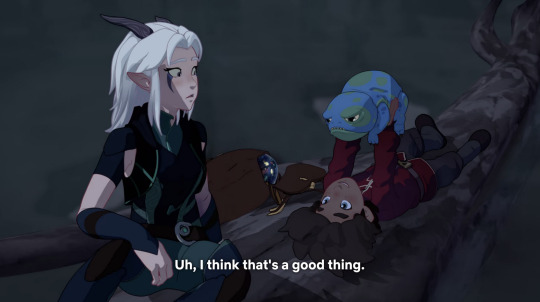
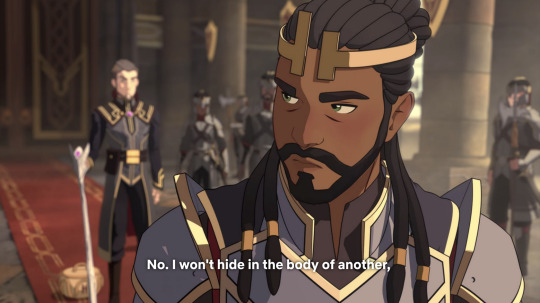

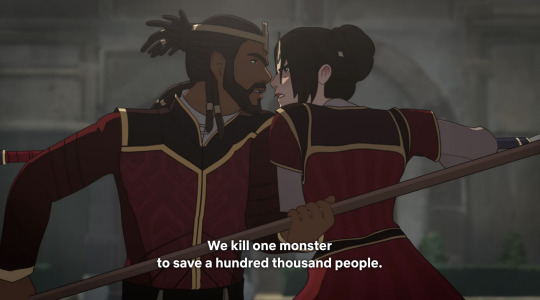

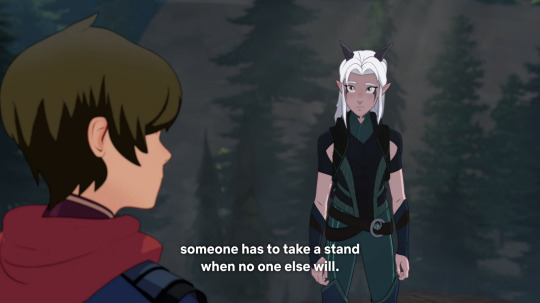
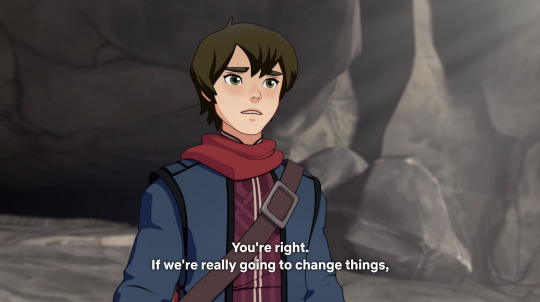
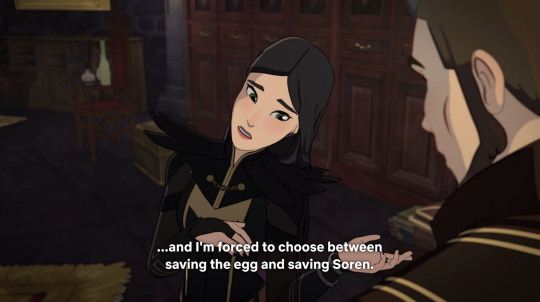

Sol Regem: No, you have two choices. You all die, or just the wretched evil human dies.


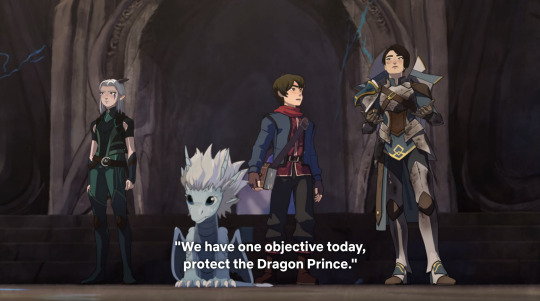



To do otherwise leads to Sarai's death as a narrative punishment. (ATLA explores this too, with Aang being literally Killed the second he successfully, albeit reluctantly, gives up his attachment to Katara. Which is harsh but very indicative, I think, as far as narrative punishments go, and reaffirmed in the finale with Aang being given a third path precisely because he refuses to surrender his attachments a second time.)
That's not to say heroes never prioritize the greater good. Rayla is very world focused ("This could end the war and change the world!" / not taking Claudia's deal in 4x09) and Ezran exchanges his freedom/safety for the chance for his soldiers to be able to lay down their arms and it's a primary concern for him in S4 ("But the kingdom needs me" "The world needs you"). Callum smashes the primal stone to hatch Zym. But, most importantly, the Heroic thing to do is to choose to lay down your life, not solely offer up others', for those causes or choices. And Viren's hesitation and later inflated self importance (among other emotions) is his Original Sin, series wise. (Even the fact he refuses to give up the egg and offer it as a possible plea for Harrow's life; he'd rather sacrifice his own because of his own paranoia than risk giving Xadia a 'weapon'.)

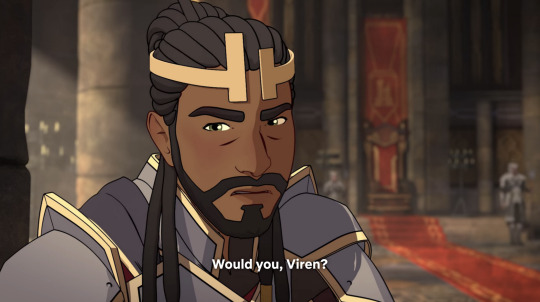
In many ways, TDP says "The villain will sacrifice you for their notion of the world (who counts as a person, etc), and the hero will save you even at the potential cost of the their world, re: themselves".
However, because this is TDP, even this dichotomy isn't Simple or clear cut. Runaan and his troupe all willfully give their lives for an ultimately lost cause that will only create more suffering and was, per the words of the story and reaction of the other characters, completely Unnecessary; Claudia is certainly prioritizing the life of the individual, but with a complete lack of regard for any other life forms as a dark mage (and isn't thinking through the long term consequences, but more on that here).
TDP also calls into question the nobility or necessity of self or self imposed sacrifice, particularly in Rayla's character and where and how it can be taken to a dangerous level. For example, her walking away from the drake is a character regression, not a progression, precisely because it throws away the life of the individual (something she largely never did before) while also reaffirming that she's far too prone to throwing her own life away unnecessarily/unfairly.

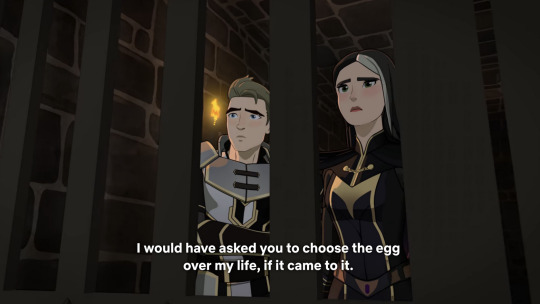
So. Where does this leave us? And what does this mean for Callum and Claudia?
Well, I think there's a few consistencies:
1) Are you sacrificing yourself because you feel like you have to (obligation and guilt) or are you sacrificing yourself because it is the right thing to do (harm mitigation)?
This is probably where Rayla and Harrow fall the most. That's also not to say this dichotomy is solid, as it can definitely be flexible / bleed into each other (Harrow's surrender of his life in 1x03 is, I believe, both). But it is useful in differentiating when Rayla is being noble (saving Zym, 2x07, 3x09, possibly 4x09) vs when she's being self-punishing (1x02, 3x08, Through the Moon, definitely 4x09).
2) Are you sacrificing others in ways you would not sacrifice yourself? Are you sacrificing yourself in ways you would not sacrifice others?
This is where I think Runaan, Viren, Rayla, and Callum primarily fall into. Viren is the only one who really hardcore engages with the first question (yes, he'll sacrifice himself, but it's almost always with an edge of disregard to others and/or a sense of ego), with Runaan, Rayla, Callum, and Claudia all leaning towards the second one. "You're going to be better now, that's all that matters" "It doesn't matter what happens to me, live or die this dragon goes home" "If me dying is the only way for you and Zym to get across safely, then it's time for me to meet the end" and "I am already dead".
3) Are you actively chasing a self destructive/sacrificial pattern or is it something you are pushed into and then have to react to?
This is the key difference (most of the time) I think between Claudia and Rayla (first option) and Callum (second option). For me, I perpetually come back to the way Callum is willing to risk his life, most often, only when he has hope of survival (i.e. he lays down his life for Ez but also immediately argues that he should get to live; Rayla talks him down in 3x01 with two words and Callum immediately starts looking for another plan; he jumps off the Pinnacle with the hope of wings). This is in direct contrast to Claudia and to Rayla. Where Ezran argues in 3x02 that children shouldn't pay for their parents' mistakes, Rayla argues the exact opposite and that she should die in 3x08. The "pushed into a corner" Callum vs Claudia "seeking it out" seems pretty consistent, but I could see Callum seeking it out a bit more in S5, particularly in relation to the coins (but we'll have to see).
Closing Thoughts
To be clear, I don't think TDP is interested in giving a Definite answer about self sacrifice and selfishness vs selflessness (sacrificing yourself can be selfish; saving yourself can be selfless; selfishness is not always a vice and sacrifice is not always a virtue). I think it's a theme, as a subset of grief and relationships, that the story has chosen to Explore in a variety of different ways.
One of the main reasons I've always leaned towards Callum and Claudia paralleling each other more directly is 1) they always have (Claudia comes up with the switching spell in 1x01 because of Callum, and that's precisely what Callum executes when he says he's Ezran, for ex), 2) Aaravos' pawns ("a song of love and loss" "Aaravos chose as his instruments" "those who fail tests of love," etc.) and 3) Claudia is primed to be the one pushing for Aaravos to be freed.
This is somewhat sympathetic because it's for her dad, but Viren-Claudia have a complicated to unhealthy kind of dynamic, and Viren isn't really a character most of the audience cares about being saved (nor does he himself, and he's already been Saved once), so the sympathy can only go so far. However, it's still pretty clear that they're both set up to get atonement/redemption arcs to a degree. The easiest way to not have Claudia be incredibly demonized is for another, good guy character, to make the same/a similar choice for a similar reason. I've gone on record saying I think Callum will either make a conscious choice where he knows he could be risking Aaravos' freedom if it snowballs, or an active choice directly freeing Aaravos, simply because who else would have the incentive, who else has the foreshadowing, and it ties together the thematic overhaul of S4 pretty well, as well as Callum's associations with Freedom thematically.
Because valuing the individual over the world isn't Wrong, just like valuing the world over the individual isn't necessarily Right. It depends on bond, sympathy, circumstance, the attitude and role of the character you're saving and who's doing the saving and how. I've said it before that every character in TDP typically wants the same thing - to protect their loved ones - and so their methods - what they're willing to do or not do, and how they do it - is what creates the moral and ethical spectrum of the show.
TLDR; sometimes we sacrifice the right things for the wrong reasons, or the wrong things for the right reasons. Claudia still doesn't think/know that Aaravos is evil (because she is a Legend at ignoring red flags and her own prejudice); Callum does. Claudia doing all this to save her father out of her own desperation would offer up a nice parallel of Callum also doing something out of desperation to protect/save the people he loves. I think they both have a great capacity to be Wrong, while (in Callum's case) also somewhat doing the Right Thing. That's why it's Moral Dubiousness, after all.
And also why his Tales of Xadia bio spells it out for us 3 different times:
Liberty: I'm beholden to my inner circle, not some silly kingdom.
Devotion: I value those close to me more than anyone or anything.
Has the lowest Justice (the defined desire to do What's Right) score of any of the main heroic characters in the trio or in the show, other than Lujanne

#tdp#the dragon prince#tdp's perpetual trolley problem#thanks for asking#requests#snake boi callum#ripple-rapple#tdp meta#analysis series#analysis#arc 2#arc 1#multi#parallels#theme: sacrifice#like to me it's not a question of If callum is going to do something Fucked but When y'know?
82 notes
·
View notes
Text
i think that the cape comics fandom mantra of “comics suck don’t read comics” has been very detrimental to new readers and to the general state of comics fan circles online in general. criticizing something is good and it’s not exactly the death knell of the industry to go “i think this thing isn’t well written/has poor characterization/isn’t well illustrated,” far from it, but i guess it’s just… i don’t think it’s good to only ever tear down and complain about something that you claim to really love.
it’s also just not encouraging for people who want to get into comics. if comics suck and are universally terrible then why should someone read them instead of getting all their information from random comic panels referencing memes posted on twitter? consuming them that way must be inherently superior to actually reading them because comics are bad and these specific scenes are flukes in otherwise terrible issues, right? there's no point in reading comics if they're all just awful.
of course i'm guilty of this. there are definitely characters where i look at their backlog and i'm just like wow, all of this sucks, but at least more and more i'm seeing people explain why they don't like or wouldn't recommend something. and just saying "this comic sucks" can easily be shorthand for "this work has something fundamentally flawed in it like racism or misogyny or what have you" and it's good to discuss those things and call them out when they might be hiding behind a shiny exterior. but while i kvetch and moan about comics all the time i do earnestly love them. more than anything, i want people to love comics the way i do. i want them to like the characters i like and enjoy the stories i enjoy, because some of those stories are the best i’ve ever read anywhere! i want them to see this art form as something worthwhile and incredible!
comics are bad, but comics are also good. i think more people would like them if they knew that.
#plus like. you can read something else! if you’re sick of big two stuff check out an indie title!#read something from boom! or image or please for the love of g-d ahoy!#if cape comics just aren’t doing it for you in general there are tons of indie comics doing new things with the medium every day#my 'if you talk about comics you should read comics' post is getting Some Notes and like. yes!!! yes!!!! please read comics!!!!#read big two cape comics read indie comics nobody's heard of and tell people about them#i love comics so much please. comics are good.
369 notes
·
View notes
Note
fav Onmyoji character and why?🤔
*cracks knuckles* Alright, you got me with this ask.
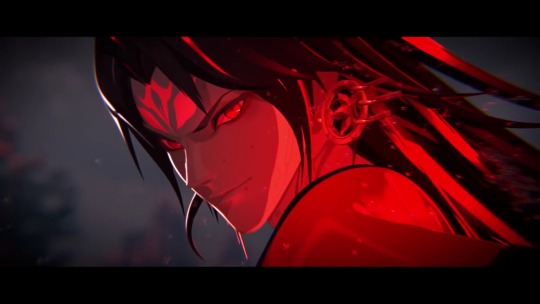
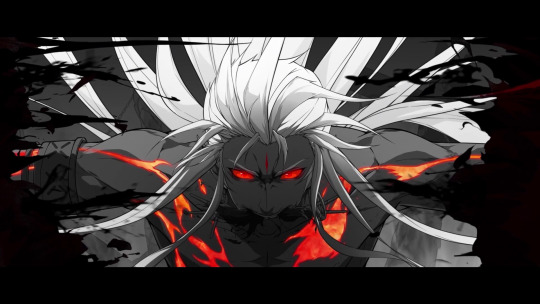
1. Asura
Objectively, the number one favorite. You cannot separate his character or his story from Taishakuten, but in the end I guess it's natural to become very attached to the hero of a specific story, (a double hero story of a hero and an anti-hero, who switch roles halfway through), especially if they're so, so wonderfully fucked up.
Asura (and when I speak of him, it applies to Taishakuten too, since neither character would be who they are without the other) is the deepest, most fleshed-out, most complicated and unique character in the entire game. His story and characterization and the accompanying media is so incredibly well produced, it can easily compete (and beat) other highly acclaimed stories out there. To think this was made, as essentially promo material, for a free-to-play mainland Chinese gacha game is absolutely NUTS. Yes I will praise this story and its production level to the stars because it irreversibly changed me. To me, this is the problematic, dramatic, queer love story. You know how Asura tells Taishakuten how meeting him was as if finally finding the thing he had been searching for all his life. This is me with this story, and this character. What I love is how he's so deeply complicated and inherently flawed, that even with the "good end" he chose for himself, his internal conflict is never resolved. He's someone who fights for genuine justice, someone who is genuinely caring, someone who's deep down insecure about himself, about opening himself up, trusting others, someone who wants to live a simple life and enjoy the little things. But he also genuinely enjoys committing mass murder, sadistic torture, he's rash and impulsive, he's someone who naturally chooses cruel means to an end. He swore to never kill again, to go against the very core of him, lock himself up and seal his own powers. And yet the first thing he does upon returning to the world of peace he made possible... is to murder without a second thought. And it's not a plot hole, it's a feature.
Even when he's sane, he "learned" to deal with his own trauma in a completely unhealthy way, possibly as self punishment. This is obvious by how he's so loving and caring when dealing with Taishakuten's trauma....
Also I just want to add one thing. I'm glad I'm somehow able to gleefully ignore the fandom at large because, sorry, they don't get it. I'm tired of seeing nothing but fans taking everything interesting away from this story and washing it down to "uwu cute domestic boyfriends". Like heck no, these characters are so good because they are made to be incredibly fucked up.

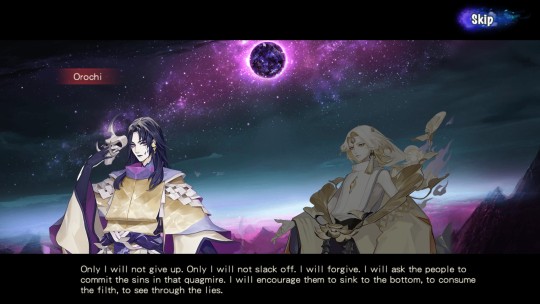

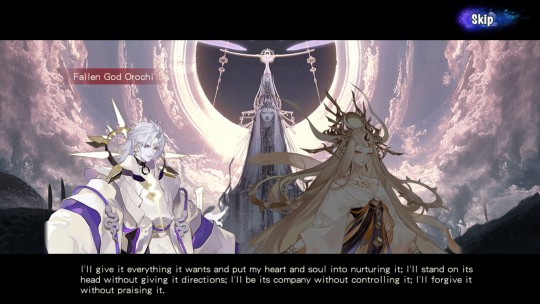
2. Orochi
Tough choice... but it's Orochi, the reason why I started playing this game. Again, a character who's absolutely delicious to rotate around in my brain like a rotisserie chicken because he's so complicated and so inherently flawed, and yet so right at the same time. Imho, he's an amazing antagonist and again, I very much distance myself from the fandom wo won't shut up about "snake eating books". Because both due to the nature of the game and its subsequent production approach, and because of its target audience, which is very much young adults despite the 8+ rating, where I don't even understand how they achieved this rating with all the outright graphic violence, drug abuse, and 900 dollar "micro" transactions etc, the story won't be explained and presented to you on a silver plate. You're supposed to come up with your own interpretation for certain parts, and it's exactly why stories for adult audiences are so enjoyable, for me anyway.
Something that is a major contributing factor to me loving Orochi so much is Miyano Mamoru's voice acting which is absolutely insane. Not sure how the director instructed him, or how much they pay him, but basically he sounds like on the verge of an orgasm the entire goddamn time with the way how he deeply savors each word on his tongue before speaking it, and it's so incredibly fitting. Maybe Miyano Mamoru understands Orochi better than the writers themselves, who knows... Regardless, the way how Orochi's character and personality is so perfectly portrayed through the voice acting is heavenly. His voice is like sickly sweet, thick, honey, innocent and nonchalant, yet dominating and bewitching. I mean. You can just hear for yourself. (Note, it's best if you can understand Japanese because the official English translations unfortunately suck.)
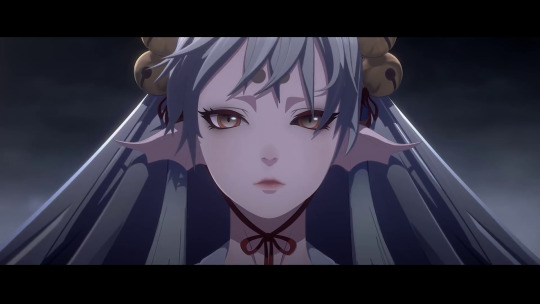

3. Suzuka
Wait, an actually good-aligned character??? Anyway, Suzuka is a wonderful take on the "big sister" archetype. She is big-hearted, kind, accepting, strong, determined, and has a great sense of responsibility. But she ends up being too trusting in others, in the way that she believes others are just as strong as her to fend for themselves, which ends up literally devastating her entire found family and the place they called home, literally killing her most important person in body and mind, her found brother. And yet, she's so strong to be able to not give up, to accept all the pain, to heal and to rebuild what they have lost. Also, as someone with the best big sister in the world, her character just makes me feel warm and fuzzy inside. She's wonderful.
And as a bonus, here's a selection of other favs in no particular order, because hell, in the end it's a waifu collection game and there's bound to be a lot of favs for varying reasons.
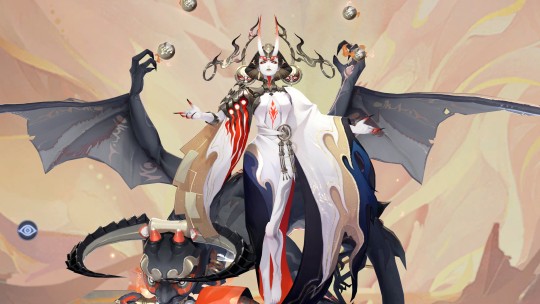
Enma, because I'm not immune to bewitching milfs, and her design is one of the absolute best in the entire game.
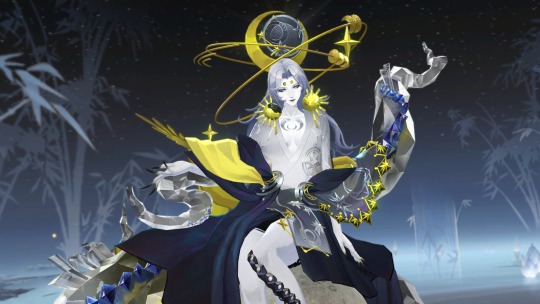
Tsukuyomi, because they're so sad and wonderfully questionable, also actually canon non-binary.

Onikiri. Groomed to be fucked up, and yet after regaining his free will, he willingly steps back into that path, because it's what he inherently craves. So delicious.
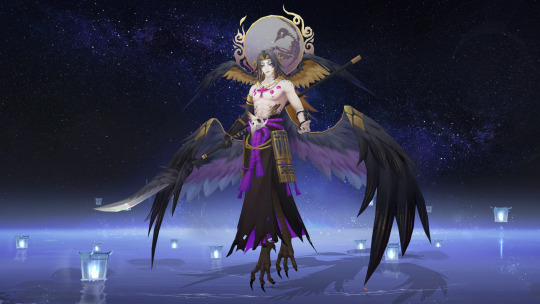
Garuda, my favorite disaster bi bird and Asura's pet dog. Probably one of the "normalest" and ironically most likeable characters. He's a bit conceited, strong and actually.... smart. And smart in the way that he knows his place, knows his limits and won't try things out of his league. And yet he can't help his smugness and want to test the waters... but he's a survivor still : ^)
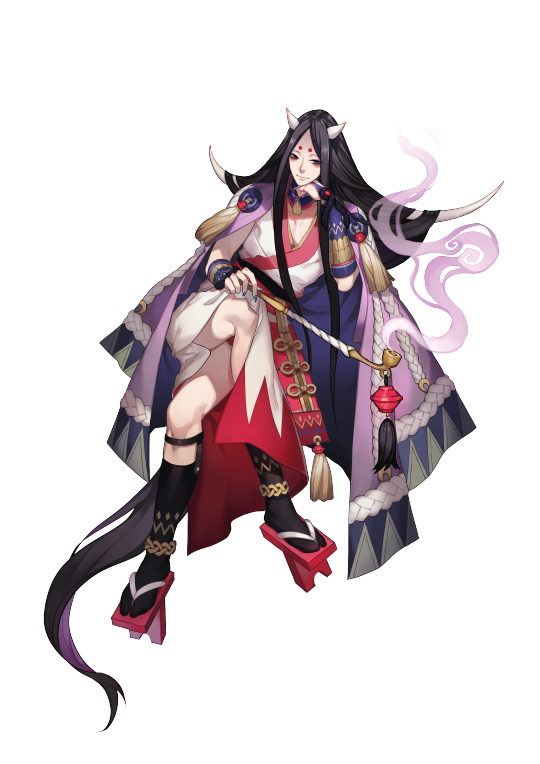
And honorary mention to my fav hairy braindead bimbo slut, Kamikui. Yep I love them very dearly, and they're also carried by incredible voice acting.
#ask#anon#onmyoji#I suppose if I tag it this will go into the public tag#when I just want to tag it for my own blog#oh well#sorry in advance
47 notes
·
View notes